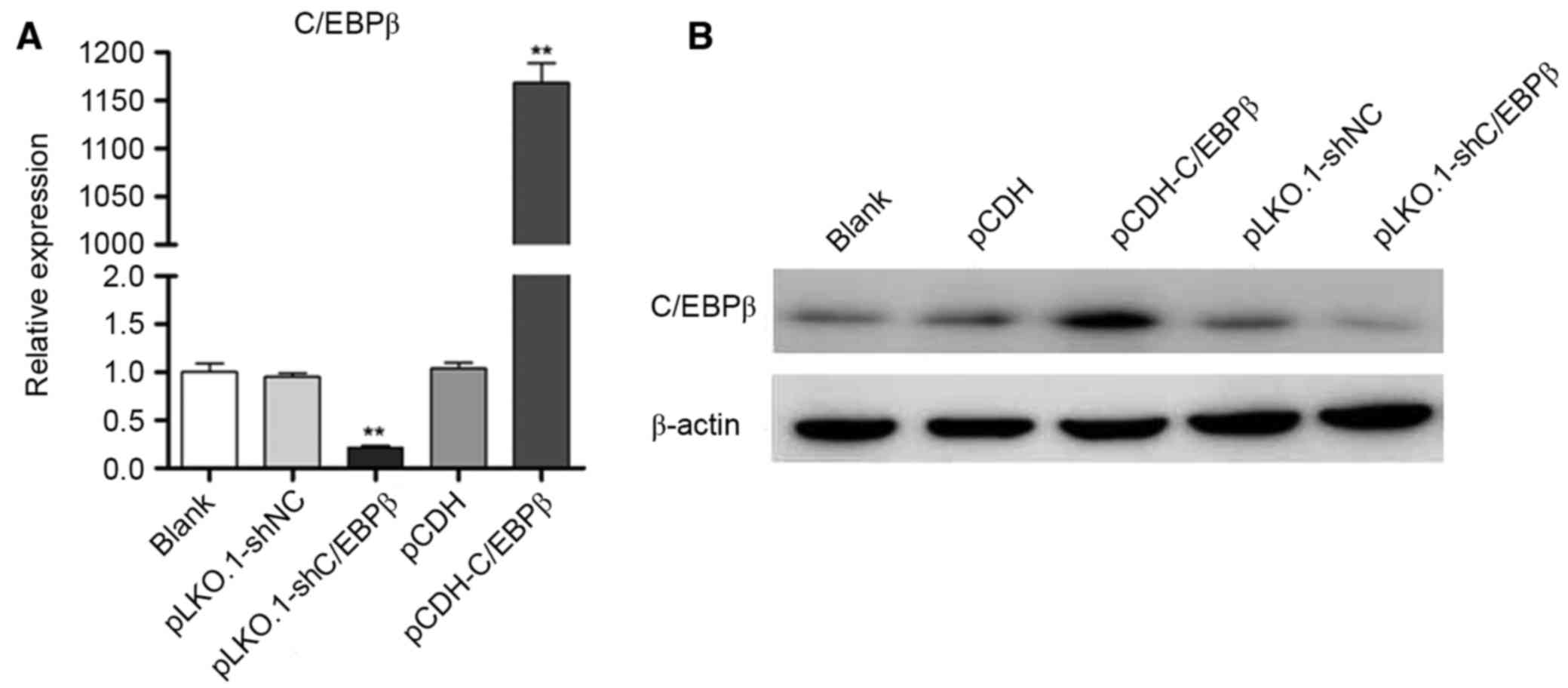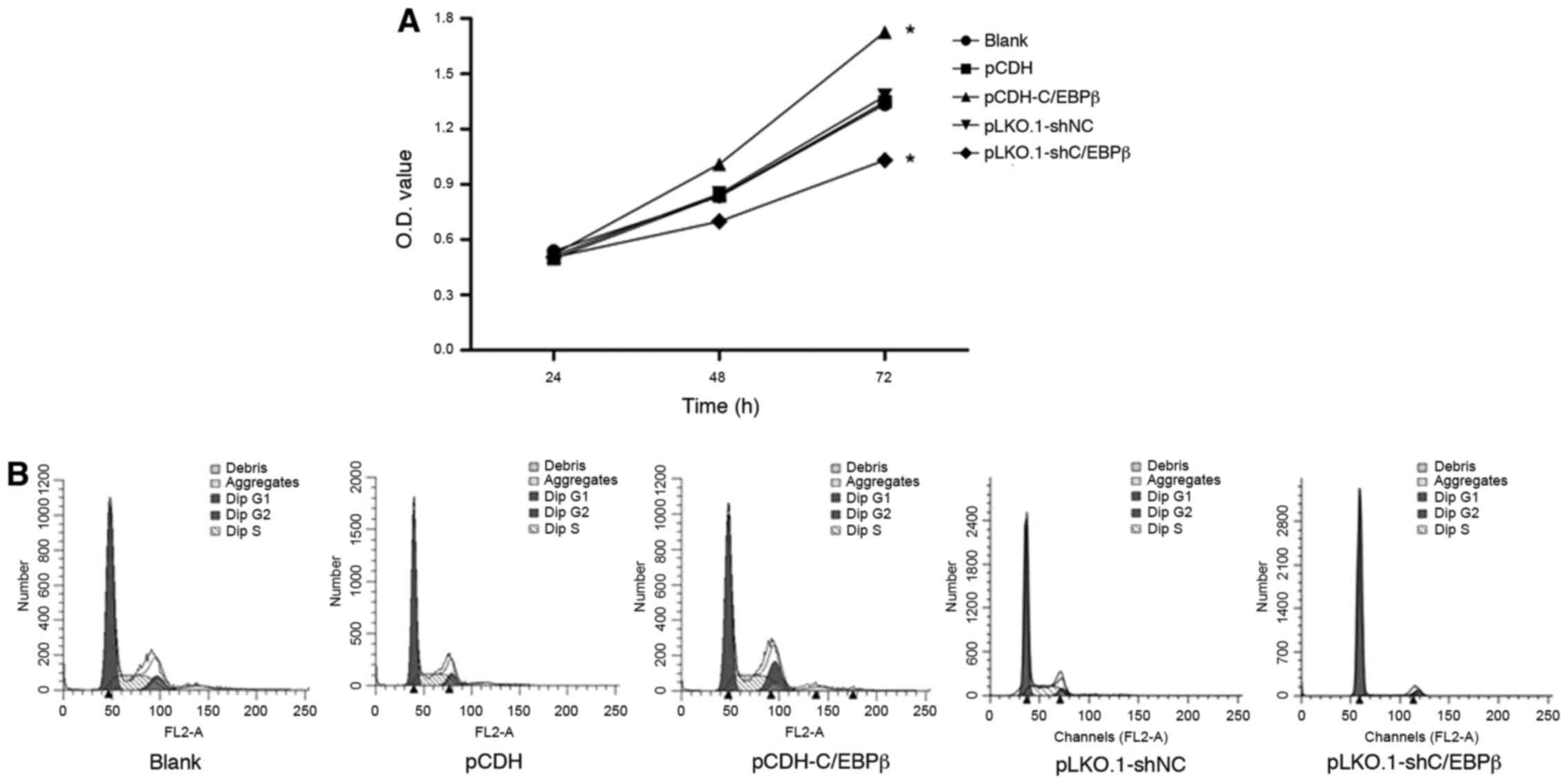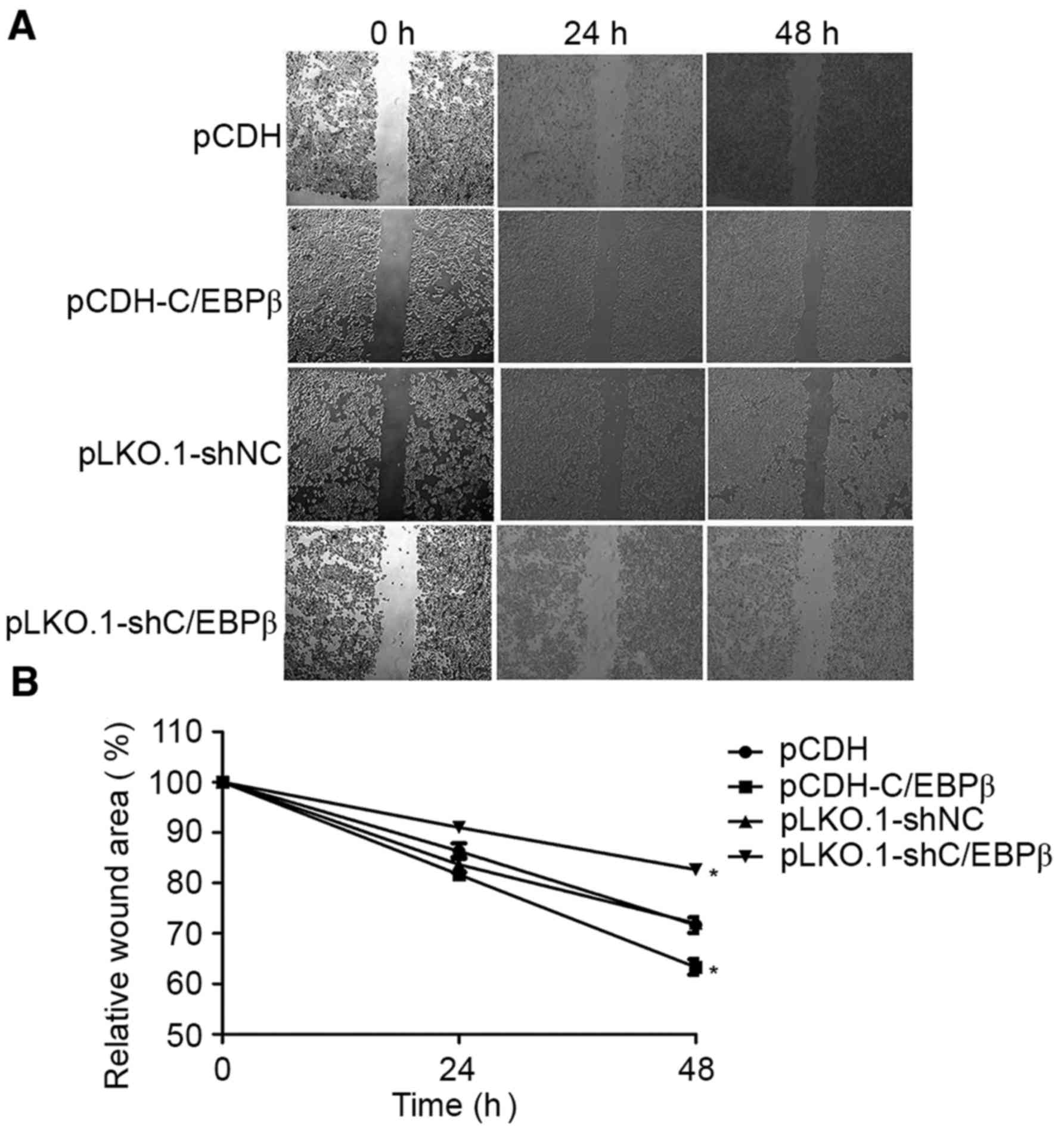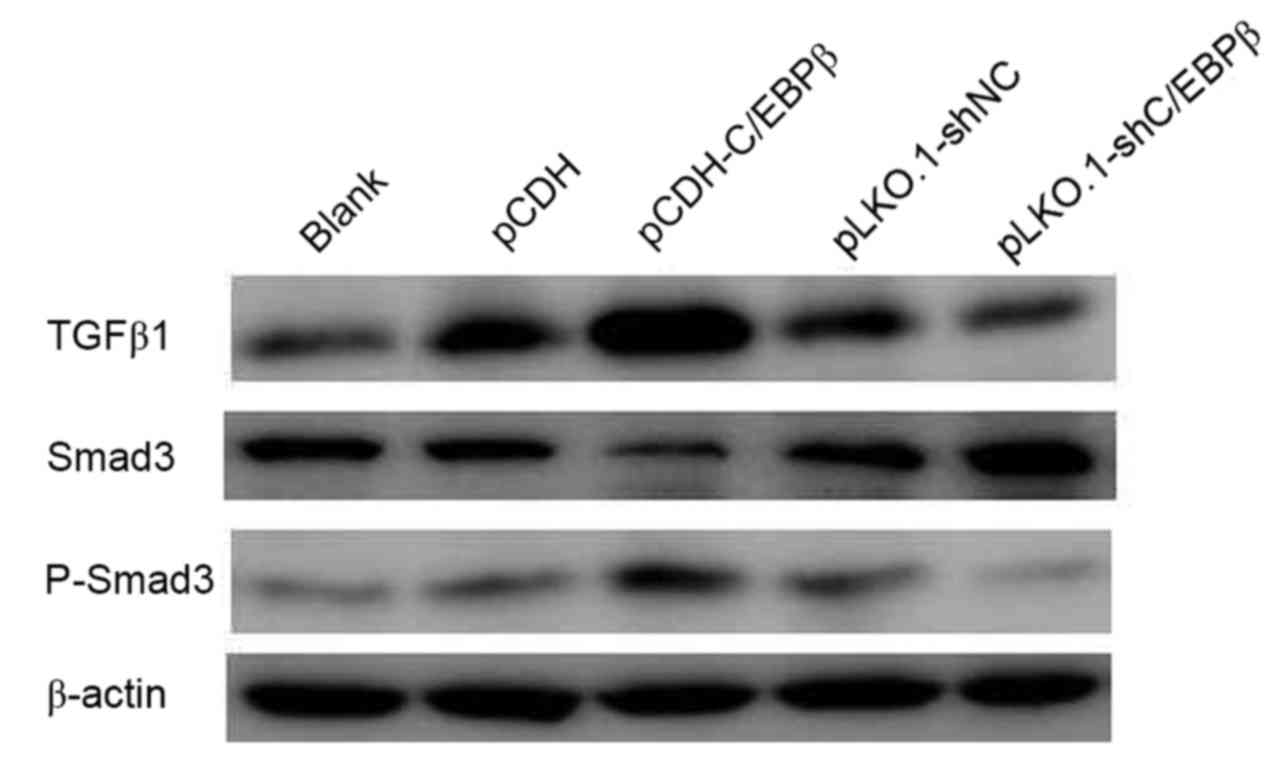|
1
|
Siegel R, Naishadham D and Jemal A: Cancer
statistics, 2013. CA Cancer J Clin. 63:11–30. 2013. View Article : Google Scholar : PubMed/NCBI
|
|
2
|
Nguyen DX, Bos PD and Massagué J:
Metastasis: From dissemination to organ-specific colonization. Nat
Rev Cancer. 9:274–284. 2009. View
Article : Google Scholar : PubMed/NCBI
|
|
3
|
Osada S, Yamamoto H, Nishihara T and
Imagawa M: DNA binding specificity of the CCAAT/enhancer-binding
protein transcription factor family. J Biol Chem. 271:3891–3896.
1996. View Article : Google Scholar : PubMed/NCBI
|
|
4
|
Poli V: The role of C/EBP isoforms in the
control of inflammatory and native immunity functions. J Biol Chem.
273:29279–29282. 1998. View Article : Google Scholar : PubMed/NCBI
|
|
5
|
Ramji DP and Foka P:
CCAAT/enhancer-binding proteins: Structure, function and
regulation. Biochem J. 365:561–575. 2002. View Article : Google Scholar : PubMed/NCBI
|
|
6
|
Cortés-Canteli M, Pignatelli M, Santos A
and Perez-Castillo A: CCAAT/enhancer-binding protein beta plays a
regulatory role in differentiation and apoptosis of neuroblastoma
cells. J Biol Chem. 277:5460–5467. 2002. View Article : Google Scholar : PubMed/NCBI
|
|
7
|
Cortes-Canteli M, Wagner M, Ansorge W and
Pérez-Castillo A: Microarray analysis supports a role for
ccaat/enhancer-binding protein-beta in brain injury. J Biol Chem.
279:14409–14417. 2004. View Article : Google Scholar : PubMed/NCBI
|
|
8
|
Zhu S, Yoon K, Sterneck E, Johnson PF and
Smart RC: CCAAT/enhancer binding protein-beta is a mediator of
keratinocyte survival and skin tumorigenesis involving oncogenic
Ras signaling. Proc Natl Acad Sci USA. 99:pp. 207–212. 2002;
View Article : Google Scholar : PubMed/NCBI
|
|
9
|
Ewing SJ, Zhu S, Zhu F, House JS and Smart
RC: C/EBPbeta represses p53 to promote cell survival downstream of
DNA damage independent of oncogenic Ras and p19 (Arf). Cell Death
Differ. 15:1734–1744. 2008. View Article : Google Scholar : PubMed/NCBI
|
|
10
|
Zahnow CA: CCAAT/enhancer binding proteins
in normal mammary development and breast cancer. Breast Cancer Res.
4:113–121. 2002. View
Article : Google Scholar : PubMed/NCBI
|
|
11
|
Gomis RR, Alarcón C, Nadal C, Van Poznak C
and Massagué J: C/EBPbeta at the core of the TGFbeta cytostatic
response and its evasion in metastatic breast cancer cells. Cancer
Cell. 10:203–214. 2006. View Article : Google Scholar : PubMed/NCBI
|
|
12
|
Johansson J, Berg T, Kurzejamska E, Pang
MF, Tabor V, Jansson M, Roswall P, Pietras K, Sund M, Religa P and
Fuxe J: MiR-155-mediated loss of C/EBPβ shifts the TGF-β response
from growth inhibition to epithelial-mesenchymal transition,
invasion and metastasis in breast cancer. Oncogene. 32:5614–5624.
2013. View Article : Google Scholar : PubMed/NCBI
|
|
13
|
Coyle-Rink J, Sweet T, Abraham S, Sawaya
B, Batuman O, Khalili K and Amini S: Interaction between TGFbeta
signaling proteins and C/EBP controls basal and Tat-mediated
transcription of HIV-1 LTR in astrocytes. Virology. 299:240–247.
2002. View Article : Google Scholar : PubMed/NCBI
|
|
14
|
Kaminska B, Wesolowska A and Danilkiewicz
M: TGF beta signalling and its role in tumour pathogenesis. Acta
Biochim Pol. 52:329–337. 2005.PubMed/NCBI
|
|
15
|
Seoane J: The TGFBeta pathway as a
therapeutic target in cancer. Clin Transl Oncol. 10:14–19. 2008.
View Article : Google Scholar : PubMed/NCBI
|
|
16
|
Wrana JL, Attisano L, Cárcamo J, Zentella
A, Doody J, Laiho M, Wang XF and Massagué J: TGF beta signals
through a heteromeric protein kinase receptor complex. Cell.
71:1003–1014. 1992. View Article : Google Scholar : PubMed/NCBI
|
|
17
|
Wang P, Yu J, Yin Q, Li W, Ren X and Hao
X: Rosiglitazone suppresses glioma cell growth and cell cycle by
blocking the transforming growth factor-beta mediated pathway.
Neurochem Res. 37:2076–2084. 2012. View Article : Google Scholar : PubMed/NCBI
|
|
18
|
Eichhorn PJ, Rodón L, Gonzàlez-Juncà A,
Dirac A, Gili M, Martínez-Sáez E, Aura C, Barba I, Peg V, Prat A,
et al: USP15 stabilizes TGF-β receptor I and promotes oncogenesis
through the activation of TGF-β signaling in glioblastoma. Nat Med.
18:429–435. 2012. View
Article : Google Scholar : PubMed/NCBI
|
|
19
|
Kaminska B, Kocyk M and Kijewska M: TGF
beta signaling and its role in glioma pathogenesis. Adv Exp Med
Biol. 986:171–187. 2013. View Article : Google Scholar : PubMed/NCBI
|
|
20
|
Livak KJ and Schmittgen TD: Analysis of
relative gene expression data using real-time quantitative PCR and
the 2(−Delta Delta C(T)) Method. Methods. 25:402–408. 2001.
View Article : Google Scholar : PubMed/NCBI
|
|
21
|
Parks RM and Cheung KL: Patient pathway
for breast cancer: Turning points and future aspirations. Future
Oncol. 11:1059–1070. 2015. View Article : Google Scholar : PubMed/NCBI
|
|
22
|
Kurzejamska E, Johansson J, Jirström K,
Prakash V, Ananthaseshan S, Boon L, Fuxe J and Religa P: C/EBPβ
expression is an independent predictor of overall survival in
breast cancer patients by MHCII/CD4-dependent mechanism of
metastasis formation. Oncogenesis. 3:e1252014. View Article : Google Scholar : PubMed/NCBI
|
|
23
|
Buck M, Poli V, Hunter T and Chojkier M:
C/EBPbeta phosphorylation by RSK creates a functional XEXD caspase
inhibitory box critical for cell survival. Mol Cell. 8:807–816.
2001. View Article : Google Scholar : PubMed/NCBI
|
|
24
|
Sebastian T, Malik R, Thomas S, Sage J and
Johnson PF: C/EBPbeta cooperates with RB:E2F to implement
Ras(V12)-induced cellular senescence. EMBO J. 24:3301–3312. 2005.
View Article : Google Scholar : PubMed/NCBI
|
|
25
|
Zhu S, Oh HS, Shim M, Sterneck E, Johnson
PF and Smart RC: C/EBPbeta modulates the early events of
keratinocyte differentiation involving growth arrest and keratin 1
and keratin 10 expression. Mol Cell Biol. 19:7181–7190. 1999.
View Article : Google Scholar : PubMed/NCBI
|
|
26
|
Aguilar-Morante D, Cortes-Canteli M,
Sanz-Sancristobal M, Santos A and Perez-Castillo A: Decreased
CCAAT/enhancer binding protein β expression inhibits the growth of
glioblastoma cells. Neuroscience. 176:110–119. 2011. View Article : Google Scholar : PubMed/NCBI
|
|
27
|
Bundy LM and Sealy L: CCAAT/enhancer
binding protein beta (C/EBPbeta)-2 transforms normal mammary
epithelial cells and induces epithelial to mesenchymal transition
in culture. Oncogene. 22:869–883. 2003. View Article : Google Scholar : PubMed/NCBI
|
|
28
|
Buck M, Poli V, van der Geer P, Chojkier M
and Hunter T: Phosphorylation of rat serine 105 or mouse threonine
217 in C/EBP beta is required for hepatocyte proliferation induced
by TGF alpha. Mol Cell. 4:1087–1092. 1999. View Article : Google Scholar : PubMed/NCBI
|
|
29
|
Abraham S, Sweet T, Khalili K, Sawaya BE
and Amini S: Evidence for activation of the TGF-beta1 promoter by
C/EBPbeta and its modulation by Smads. J Interferon Cytokine Res.
29:1–7. 2009. View Article : Google Scholar : PubMed/NCBI
|
|
30
|
Abraham S, Sweet T, Sawaya BE, Rappaport
J, Khalili K and Amini S: Cooperative interaction of C/EBP beta and
Tat modulates MCP-1 gene transcription in astrocytes. J
Neuroimmunol. 160:219–227. 2005. View Article : Google Scholar : PubMed/NCBI
|
|
31
|
Feinberg MW, Watanabe M, Lebedeva MA,
Depina AS, Hanai J, Mammoto T, Frederick JP, Wang XF, Sukhatme VP
and Jain MK: Transforming growth factor-beta1 inhibition of
vascular smooth muscle cell activation is mediated via Smad3. J
Biol Chem. 279:16388–16393. 2004. View Article : Google Scholar : PubMed/NCBI
|
|
32
|
Zauberman A, Lapter S and Zipori D: Smad
proteins suppress CCAAT/enhancer-binding protein (C/EBP) beta- and
STAT3-mediated transcriptional activation of the haptoglobin
promoter. J Biol Chem. 276:24719–24725. 2001. View Article : Google Scholar : PubMed/NCBI
|
|
33
|
Wotton D and Massagué J: Smad
transcriptional corepressors in TGF beta family signaling. Curr Top
Microbiol Immunol. 254:145–164. 2001.PubMed/NCBI
|
|
34
|
Seoane J: Escaping from the TGFbeta
anti-proliferative control. Carcinogenesis. 27:2148–2156. 2006.
View Article : Google Scholar : PubMed/NCBI
|



















